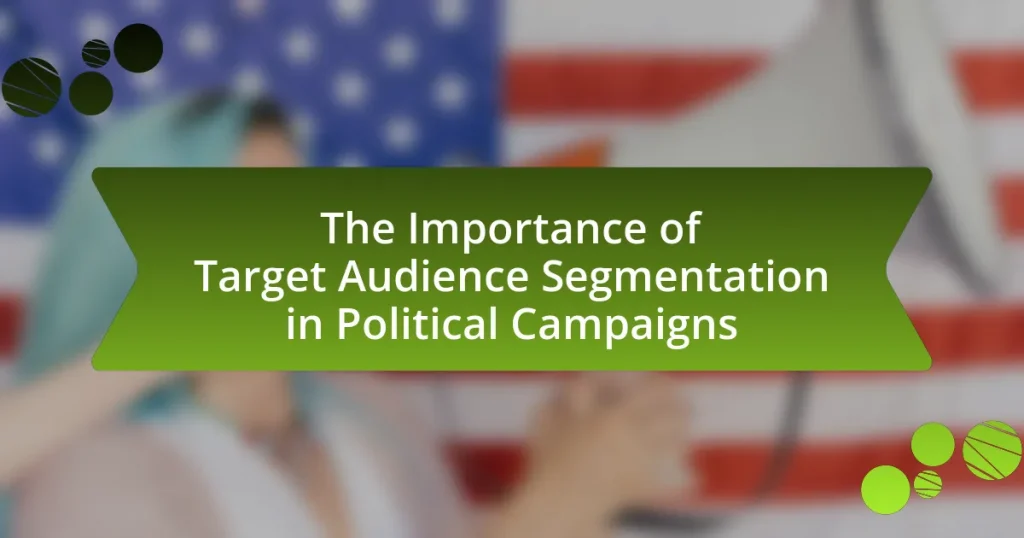The article examines the significant role of endorsements in shaping campaign strategies, highlighting how they enhance a candidate’s credibility and expand their reach to potential voters. It discusses the influence of endorsements on voter perception, the psychological factors that make them effective, and the various types of endorsements, including individual, organizational, and celebrity endorsements. Additionally, the article explores how endorsements can mobilize specific demographics, impact fundraising efforts, and shape campaign messaging, while also addressing potential risks and best practices for leveraging endorsements effectively in political campaigns.

What is the role of endorsements in campaign strategies?
Endorsements play a crucial role in campaign strategies by enhancing a candidate’s credibility and expanding their reach to potential voters. When influential figures or organizations publicly support a candidate, it signals to voters that the candidate is trustworthy and has the backing of respected entities. For instance, endorsements from well-known politicians or community leaders can significantly sway undecided voters, as seen in the 2008 U.S. presidential election when Barack Obama received endorsements from prominent figures, which helped solidify his support base. Additionally, endorsements can mobilize specific demographics, as organizations often have established networks that can be leveraged for voter outreach. This strategic advantage underscores the importance of endorsements in shaping public perception and influencing electoral outcomes.
How do endorsements influence voter perception?
Endorsements significantly influence voter perception by enhancing the credibility and appeal of candidates. When a respected figure or organization endorses a candidate, it can lead to increased trust and a positive association in the minds of voters. Research indicates that endorsements can sway undecided voters, as they often rely on the opinions of trusted sources to make informed decisions. For example, a study by the Pew Research Center found that 70% of voters consider endorsements from local leaders as influential in their voting choices. This demonstrates that endorsements not only validate a candidate’s qualifications but also shape the overall narrative of their campaign, ultimately impacting voter behavior.
What psychological factors make endorsements effective?
Endorsements are effective due to several psychological factors, including credibility, social proof, and emotional appeal. Credibility arises when the endorser is perceived as trustworthy and knowledgeable, which enhances the persuasive power of the message. Social proof influences individuals by demonstrating that others, particularly those they admire or relate to, support a product or idea, thereby increasing its perceived value. Emotional appeal connects with the audience on a personal level, often leading to stronger engagement and a greater likelihood of action. Research by Cialdini (2009) highlights that these factors significantly impact consumer behavior, reinforcing the effectiveness of endorsements in shaping perceptions and decisions.
How do endorsements shape public opinion during campaigns?
Endorsements significantly shape public opinion during campaigns by leveraging the credibility and influence of the endorsers. When a respected figure or organization endorses a candidate, it can enhance the candidate’s perceived legitimacy and appeal, often swaying undecided voters. For instance, a study by the Pew Research Center found that 70% of voters consider endorsements from trusted figures as influential in their decision-making process. This influence is particularly pronounced in partisan contexts, where endorsements can reinforce existing biases and mobilize voter turnout.
What types of endorsements exist in political campaigns?
In political campaigns, there are several types of endorsements, including individual endorsements, organizational endorsements, and celebrity endorsements. Individual endorsements come from prominent figures, such as politicians or community leaders, who publicly support a candidate. Organizational endorsements are provided by groups, such as labor unions or political action committees, which can mobilize their members to support the endorsed candidate. Celebrity endorsements leverage the influence of well-known personalities to attract attention and sway public opinion. These endorsements can significantly impact voter perceptions and campaign strategies, as evidenced by studies showing that endorsements can increase a candidate’s visibility and credibility among voters.
How do celebrity endorsements differ from political endorsements?
Celebrity endorsements primarily promote products or brands, leveraging the star power of individuals to influence consumer behavior, while political endorsements focus on supporting candidates or policies, aiming to sway public opinion and voter behavior. The effectiveness of celebrity endorsements often relies on the emotional connection fans have with the celebrity, as seen in campaigns like Nike’s collaboration with athletes, which can lead to increased sales. In contrast, political endorsements are typically based on ideological alignment and credibility, as demonstrated by endorsements from influential figures like Barack Obama, which can significantly impact election outcomes by mobilizing voters.
What role do grassroots endorsements play in campaign success?
Grassroots endorsements significantly enhance campaign success by building credibility and mobilizing voter support. These endorsements often come from local community leaders and organizations, which resonate more with voters than endorsements from high-profile figures. Research indicates that candidates who receive grassroots endorsements can experience increased voter turnout; for instance, a study by the Pew Research Center found that local endorsements can lead to a 10-15% increase in voter engagement. This effect is particularly pronounced in competitive races, where grassroots support can sway undecided voters and solidify a candidate’s base.
Why are endorsements considered powerful tools in campaigns?
Endorsements are considered powerful tools in campaigns because they leverage the credibility and influence of respected figures to sway public opinion. When a well-known individual or organization endorses a candidate, it can significantly enhance the candidate’s perceived legitimacy and appeal, often leading to increased voter trust and support. For instance, endorsements from prominent political figures or organizations can lead to a measurable boost in polling numbers, as seen in various electoral cycles where candidates receiving high-profile endorsements experienced a surge in voter engagement and donations. This phenomenon underscores the strategic importance of endorsements in shaping campaign narratives and mobilizing voter bases.
How do endorsements enhance a candidate’s credibility?
Endorsements enhance a candidate’s credibility by providing validation from respected figures or organizations, which can influence public perception. When a well-known politician, celebrity, or organization endorses a candidate, it signals to voters that the candidate is trustworthy and has the support of influential individuals, thereby increasing their legitimacy. For instance, a study by the Pew Research Center found that 70% of voters consider endorsements from local leaders as important in their decision-making process. This demonstrates that endorsements can significantly sway voter opinions and enhance a candidate’s perceived reliability and competence.
What impact do endorsements have on fundraising efforts?
Endorsements significantly enhance fundraising efforts by increasing credibility and attracting donor attention. When a well-known figure or organization endorses a campaign, it often leads to a surge in donations, as supporters are more likely to contribute to a candidate or cause they perceive as credible and supported by trusted individuals. For instance, a study by the Pew Research Center found that campaigns with high-profile endorsements can see a 20-30% increase in fundraising within weeks of the endorsement announcement. This demonstrates that endorsements not only validate a campaign’s mission but also mobilize financial support, making them a powerful tool in shaping fundraising strategies.
How can endorsements be strategically utilized in campaigns?
Endorsements can be strategically utilized in campaigns by leveraging the credibility and influence of respected figures to enhance the campaign’s message and reach. When a well-known individual endorses a candidate or cause, it can significantly increase public trust and engagement, as evidenced by a study from the Pew Research Center, which found that 70% of voters are more likely to support a candidate endorsed by a trusted figure. Additionally, endorsements can help target specific demographics, as different endorsers resonate with various voter segments, thereby broadening the campaign’s appeal.
What are the potential risks associated with endorsements?
The potential risks associated with endorsements include damage to credibility, backlash from the audience, and legal implications. When a public figure endorses a product or candidate, their reputation is at stake; if the endorsed entity faces controversy, it can negatively impact the endorser’s image. For example, a study by the American Psychological Association found that endorsements can lead to public disapproval if the endorsed brand is involved in unethical practices. Additionally, endorsements can provoke backlash from opposing groups, leading to polarized reactions that may alienate certain voter demographics. Legal risks also arise, particularly if endorsements are not disclosed properly, which can result in regulatory penalties.

How do endorsements affect campaign messaging?
Endorsements significantly enhance campaign messaging by lending credibility and authority to candidates. When a respected figure or organization endorses a candidate, it can shift public perception and increase voter trust, as seen in the 2008 presidential election when Barack Obama received endorsements from influential figures like Oprah Winfrey, which helped solidify his image and broaden his appeal. Research indicates that endorsements can lead to increased voter turnout and support, as they often signal to voters that a candidate is a viable choice, thereby influencing their decision-making process.
What messaging strategies are enhanced by endorsements?
Endorsements enhance messaging strategies by increasing credibility, improving audience trust, and amplifying reach. When a respected figure endorses a product or campaign, it lends authority and authenticity, making the message more persuasive. Research indicates that 92% of consumers trust recommendations from individuals over advertisements, highlighting the effectiveness of endorsements in shaping perceptions and driving engagement. This trust translates into higher conversion rates, as endorsed messages are perceived as more reliable and relatable.
How can endorsements help in targeting specific voter demographics?
Endorsements can significantly aid in targeting specific voter demographics by leveraging the credibility and influence of respected figures within those groups. When a candidate receives an endorsement from a well-regarded community leader or organization, it can enhance their appeal to that demographic, as voters often trust the judgment of individuals they admire or relate to. For example, endorsements from local activists can resonate with younger voters who prioritize social justice issues, while endorsements from business leaders may attract economically focused voters. Research indicates that endorsements can increase voter turnout by as much as 10%, particularly among demographics that feel represented by the endorser. This strategic alignment not only boosts a candidate’s visibility within targeted groups but also fosters a sense of community support, making endorsements a powerful tool in campaign strategies.
What role do endorsements play in shaping campaign narratives?
Endorsements play a crucial role in shaping campaign narratives by lending credibility and influence to candidates. When a respected figure or organization endorses a candidate, it can significantly sway public perception and voter behavior, as seen in the 2008 U.S. presidential election when Barack Obama received endorsements from prominent figures like Oprah Winfrey, which helped to enhance his appeal and narrative of change. Endorsements can also frame the issues a campaign focuses on, as they often highlight specific policies or values that resonate with the endorser’s audience, thereby aligning the candidate’s narrative with broader societal concerns. This strategic alignment can amplify a candidate’s message and create a more compelling story that attracts support.
How do endorsements influence campaign advertising?
Endorsements significantly influence campaign advertising by enhancing credibility and increasing voter trust in candidates. When a well-respected figure endorses a candidate, it can lead to a positive shift in public perception, as seen in the 2008 presidential election when Barack Obama received endorsements from influential figures like Oprah Winfrey, which helped boost his visibility and appeal. Research indicates that endorsements can increase a candidate’s support by as much as 10% among undecided voters, demonstrating their effectiveness in shaping campaign strategies.
What types of advertisements benefit from endorsements?
Advertisements that benefit from endorsements include consumer goods, beauty products, sports equipment, and technology brands. These types of advertisements leverage endorsements to enhance credibility and influence purchasing decisions. For instance, a study by the American Marketing Association found that celebrity endorsements can increase brand recognition by up to 20% and significantly boost sales, particularly in the beauty and fashion sectors. This demonstrates the effectiveness of endorsements in creating a positive association between the endorser and the product, ultimately driving consumer behavior.
How can endorsements be integrated into digital marketing strategies?
Endorsements can be integrated into digital marketing strategies by leveraging influencers and brand ambassadors to promote products or services across various online platforms. This approach enhances credibility and reach, as studies show that 49% of consumers depend on influencer recommendations for their purchasing decisions. Brands can utilize social media campaigns, sponsored content, and affiliate marketing to effectively showcase endorsements, thereby increasing engagement and conversion rates. For instance, a survey by the Digital Marketing Institute found that 70% of teenagers trust influencers more than traditional celebrities, highlighting the effectiveness of endorsements in reaching target demographics.

What are the best practices for leveraging endorsements in campaigns?
The best practices for leveraging endorsements in campaigns include selecting credible endorsers, aligning endorsements with campaign values, and utilizing multiple platforms for visibility. Credible endorsers, such as respected public figures or industry leaders, enhance trust and authenticity, which can significantly influence voter perceptions. Aligning endorsements with campaign values ensures consistency and strengthens the message, making it more relatable to the target audience. Utilizing multiple platforms, including social media, traditional media, and events, maximizes the reach and impact of endorsements, as evidenced by studies showing that campaigns with diverse outreach strategies see higher engagement rates.
How can candidates effectively choose endorsers?
Candidates can effectively choose endorsers by selecting individuals who align with their values, resonate with their target audience, and possess credibility in relevant fields. This strategic alignment ensures that the endorsement enhances the candidate’s image and reaches potential voters effectively. For instance, a candidate focused on environmental issues may seek endorsements from well-known environmental activists or organizations, thereby reinforcing their commitment to sustainability. Research indicates that endorsements from trusted figures can significantly influence voter perceptions and decisions, as seen in studies showing that candidates endorsed by respected community leaders often experience increased support in polls.
What criteria should be considered when selecting endorsers?
When selecting endorsers, key criteria include relevance to the target audience, credibility, and alignment with brand values. Relevance ensures that the endorser resonates with the demographic being targeted, increasing the likelihood of engagement. Credibility is crucial, as endorsers with a strong reputation can enhance trust in the brand; for instance, a study by the American Marketing Association found that credible endorsers can increase purchase intentions by up to 50%. Alignment with brand values ensures that the endorser’s image and beliefs reflect those of the brand, fostering authenticity and connection with consumers.
How can candidates build relationships with potential endorsers?
Candidates can build relationships with potential endorsers by engaging in consistent and meaningful communication. Establishing rapport through networking events, personalized outreach, and demonstrating shared values can foster trust and mutual interest. Research indicates that candidates who actively listen to endorsers’ concerns and align their campaign messages with the endorsers’ priorities are more likely to secure endorsements. For example, a study by the Pew Research Center found that 70% of voters trust endorsements from individuals they respect, highlighting the importance of building genuine connections.
What common mistakes should be avoided when using endorsements?
Common mistakes to avoid when using endorsements include selecting endorsers who lack credibility or relevance to the target audience, which can undermine the effectiveness of the endorsement. Additionally, failing to ensure that the endorsement aligns with the brand’s values can lead to public backlash. Research indicates that 63% of consumers are more likely to trust a brand when it is endorsed by someone they perceive as authentic and relatable. Another mistake is not leveraging the endorsement across multiple platforms, as this can limit the reach and impact of the message. Lastly, neglecting to measure the endorsement’s effectiveness can result in missed opportunities for optimization in future campaigns.
How can over-reliance on endorsements backfire?
Over-reliance on endorsements can backfire by creating a perception of inauthenticity and diminishing the candidate’s own credibility. When candidates depend heavily on endorsements, voters may question their ability to stand on their own merits, leading to skepticism about their qualifications and values. For instance, a study by the Pew Research Center found that 62% of voters believe that candidates who rely too much on endorsements lack genuine support from the public. This skepticism can result in decreased voter trust and engagement, ultimately harming the candidate’s campaign.
What are the pitfalls of choosing controversial endorsers?
Choosing controversial endorsers can lead to significant reputational risks for brands. These endorsers may attract negative media attention, which can overshadow the intended message of the campaign. For instance, a study by the Journal of Advertising found that brands associated with controversial figures often experience a decline in consumer trust and loyalty, as 60% of consumers reported feeling less favorable towards brands linked to such endorsers. Additionally, the backlash from the public can result in boycotts or social media campaigns against the brand, further damaging its image and sales.
What practical tips can candidates follow to maximize endorsement impact?
Candidates can maximize endorsement impact by strategically selecting endorsers who align with their values and target audience. This alignment ensures that the endorsement resonates with voters, enhancing credibility and relatability. For instance, a candidate endorsed by a well-respected community leader can leverage that leader’s influence to reach undecided voters, as studies show that endorsements from trusted figures can significantly sway public opinion. Additionally, candidates should actively promote endorsements through various channels, including social media and press releases, to amplify their visibility and reinforce their campaign message. Engaging endorsers in campaign events can also create a personal connection with voters, further solidifying the endorsement’s impact.



